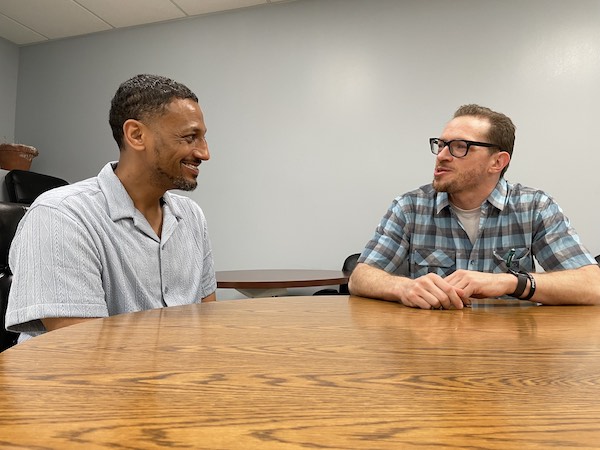
JACKSON HEIGHTS — Daniel Warner was in a rehab facility struggling to overcome drug abuse when he looked out the window and saw a rainbow in the sky. He said he knew at that moment that God was with him and that he could be OK.
Surafel Getachew’s life was spiraling out of control from drug use. So, one night, he got on his knees and begged God for help. He said God helped him turn his life around.
Now clean and sober, Warner and Getachew are determined to help others overcome drug addiction. The men serve as counselors for the Opioid Prevention and Treatment (OPT) program, which is run by Catholic Charities Brooklyn and Queens (CCBQ).
The program operates out of the agency’s five behavioral health centers in Jackson Heights, Jamaica, Woodhaven, Far Rockaway, and Flatbush.
Warner is a peer counselor in the OPT program and meets with CCBQ clients in group settings. Getachew is an addiction counselor and meets with clients one-on-one. Both men use their life experiences in their work.
The OPT program, started by CCBQ two years ago, has six counselors and serves 30-40 clients, said project director Andrew Karim. The program is open to anyone seeking help in their recovery process and offers Medication Assisted Treatment (MAT) as well as peer counseling.
According to a 2024 report issued by the New York State Department of Health (DOH), the number of opioid-related drug overdose deaths among New York State residents increased by 400% between 2010 and 2022. The rate was three times higher among males than among females.
In an effort to spread awareness of OPT, CCBQ released videos of Warner and Getachew talking about how they overcame drug abuse.
Warner, 39, who is Catholic and grew up on Long Island, said his faith pulled him through during hard times.
“I used to think it was a coincidence that I came through everything in my life. Now I realize that it was God helping me,” he said.
Warner said his history of drug use goes back to when he was a teenager.
“It started out as just a little bit of fun with some friends, but then it turned into self-medication,” he recalled. “It started with pot and then alcohol, and then I graduated to cocaine, and a lot of prescription pills would be passed around among my circle of friends.”
Warner’s family staged an intervention and convinced him to seek help. That’s when he voluntarily entered into rehab and began a path to recovery. It was a bumpy road with some relapses, he noted, but he ultimately made it through and has been drug-free for nine years. Now, he said he feels he can better help people because he has been through it and benefited from working with a peer counselor.
“I made many attempts at recovery throughout the years, but it wasn’t until I heard someone who was speaking my language, when I heard my story coming out of someone else’s mouth, that it was a lot easier to make that connection that my recovery was possible,” he explained.
Warner has been a peer counselor for two years.
AN ALARMING RISE
** Opioid-related overdose deaths in New York State increased by 400% between 2010 and 2022. — Source: NYS Department of Health
** In 2022, nearly 108,000 people died from drug overdoses in the U.S., and 76% of those deaths involved opioids. — Source: U.S. Centers for Disease Control and Prevention
** For more information on Catholic Charities Brooklyn and Queens’ Opioid Prevention and Treatment program, call 718-253-4477. To view the videos about the program, visit: ccbq.org/service/opioid
Peer counseling is an essential part of OPT, according to Karim.
“The peer counselors are able to do things therapists can’t really do. Therapists can’t really self-disclose about their own history,” he said, noting that peer counselors also bring a personal touch to the recovery process.
“A lot of times, when clients get discharged, they get a paper with an appointment time and an address. It’s very impersonal. But when a peer is there, it puts a friendly face on things and increases the chance of them actually making their therapy appointments,” Karim explained.
Getachew, 46, has been drug-free for five years. He started working at CCBQ this year. Prior, he was in auto sales and real estate, which he said he was “comfortable with.”
But I didn’t like it as much as I like providing substance abuse counseling,” he said.
Born in Ethiopia and raised in the Bronx and Long Island, Getachew said he tried marijuana as a teenager and then graduated to narcotics. His drug use continued into adulthood, when he admits he also sold drugs. He knew it was ruining his life, but he felt helpless.
An Orthodox Christian, he dropped to his knees one night and begged God for help.
RELATED: God Wants To Help People Discover Their Worth, Dignity, Pope Says During General Audience
That help arrived, but not in the way he expected. At one point, he was arrested and charged with selling drugs. The court offered him the chance to enter a substance abuse therapy program in lieu of jail, and he grabbed the opportunity.
“It was part of getting me out of trouble, but it helped me change,” he recalled.
Getachew decided he wanted to help others. One lesson he tries to teach clients is to keep moving forward in recovery, even in the face of relapses.
“You can learn so much from a relapse. The best thing about a mistake is what you learn from it and try to learn how to avoid it next time,” he said.
When asked if he felt his arrest was a blessing in disguise, Getachew replied, “Yes, absolutely, 100%.”
